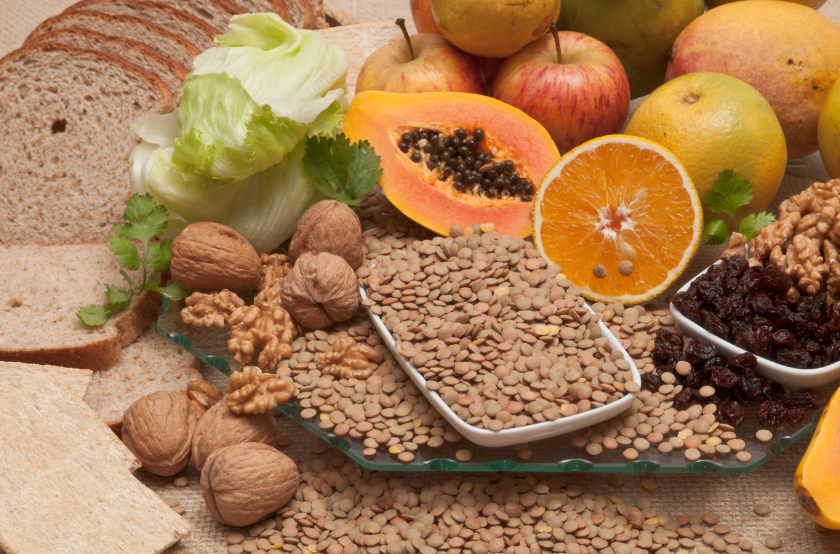Could eating the wrong food at the wrong time be the reason why you’re stuck with your weight?
If you are between 18 and 50, and you haven’t been syncing your diet with your cycle, this could be the most important thing you read today.

Female metabolism isn’t just very different from male metabolism, but it also changes throughout our lifecycle. Besides puberty, this change is most noticeable when we enter perimenopause.
It can largely vary between individuals, but usually we start experiencing some very annoying changes somewhere between 35 and 45. Not a tricky guess… This difference is: changing hormone levels.
But… hang on a minute… Our hormone levels don’t just change twice in our lifetime. They change within each and every month!
When you seek advice on your perimenopause symptoms you might be told that improving your diet and lifestyle can ease your struggles. This is because diet and lifestyle changes can improve your hormone balance.
But then why wouldn’t you eat for this balance throughout your monthly cycle?
Listen to this…
1 in 10 women in childbearing age struggle with PCOS
- 1 in 7 women struggle to get pregnant
- 1 in 10 women are diagnosed with endometriosis
- 1 in 4 women suffer from premenstrual symptoms
- 1 in 4 women suffer from severe perimenopausal symptoms
Just because it’s common, it doesn’t mean that it’s normal.
Your hormones levels have a very sophisticated rhythm throughout the menstrual cycle. This rhythm makes sure that everything goes as it is meant to: your three main sex hormones, oestrogen, progesterone and testosterone, rise and fall in a beautifully orchestrated symphony to make sure that you ovulate and bleed regularly.
While “normal” has a wide spectrum, one thing is absolutely sure. None of this should disrupt your daily life, in any way.
Understanding how your hormones work
Female hormones have an incredible network. Your sex hormones are influenced by other hormones with other functions. The ones that most require your attention are cortisol, your stress hormone, insulin, that regulates your blood sugar, and oxytocin, that makes you feel calm and relaxed.
But the network doesn’t end here. The function of these hormones are affected by yet other hormones, like melatonin, your sleep hormone, and serotonin, that doesn’t only affect your mood, but also have a role in regulating your digestion, appetite and libido.
The bad news: the balance of your hormones is affected by your diet.
The good news: the balance of your hormones is affected by your diet!
By creating the right nutritional environment through eating the right foods at the right time, you can support both your hormone production (increasing levels) and your hormone metabolism (decreasing levels).
The right food at the right time
The main hormones that are regulating your cycle are oestrogen, progesterone and testosterone. Throughout your cycle the levels of these are rising and falling in a certain rhythm to control ovulation and menstruation.
Apart from these, there are three important ones that directly affect the levels of your main se hormones: insulin, cortisol and oxytocin.
Eating to support your natural hormonal cycle means to adjust your nutrient intake the way it supports hormone production and hormone metabolism, at the very time it is happening.
This includes
- adjusting your carbohydrate, protein, and fat intake
- keeping your vitamin and mineral levels topped up
- focusing on detoxing at the right times
While it’s always a good idea to support the rising and decreasing hormonal cycle, during perimenopause it can be a life saver. It could mean the difference between having a hard time and sailing through your hormonal changes.
Three other tools to support your hormonal health
There are three other tools that you can use to improve your hormone balance.
- Not eating at certain times.
Depending on your own individual biochemistry, time restricted eating can be incredibly helpful to regulate your hormonal balance. But only if it is done the right way!
- Changing your exercise routine.
Not all exercises are created equal when it comes to hormonal health. Throughout the different phases of your cycle, both your cortisol tolerance and your insulin sensitivity changes. As exercise directly influences both of these, timing your favourite types of physical activity right can be a game changer. - Destressing at the right times
At certain hormonal phases your body is more sensitive to cortisol. Allow yourself to take it easy at these times and your insulin and oestrogen levels will thank you.
The beauty of individual differences
Of course we all are different, and so is our hormonal rhythm. Not only the length of our cycles vary, but also the length of each of the four phases within our cycle. To go further, the length of each of these phases also vary month by month in each individual.
So how do you know how to sync your diet, fasting routine and exercise to support this ever changing cycle?
Learn to read your own hormonal compass
Understanding the messages your hormones are sending you, is essential to understand your cycle and detect the changes in your hormone levels. Making yourself aware of your own, individual set of messages will always help you to actively keep your balance, but becomes all the more useful, when you step into perimenopause and your hormone levels rise and fall randomly throughout your cycle.
Therefore, understanding your special set of messages is top priority at WholeSoMe Nutrition, and it is the first thing I teach my clients as part of the Hormone Reset Programme.
Your takeaway
It’s always a good idea to support your natural hormonal cycle, but during perimenopause it might mean the difference between having it hard, or having it easy.
Adjusting your diet and lifestyle to aid hormone production and hormone metabolism can influence your cycle and your symptoms.
Taking in the right nutrients, detoxing, moving, fasting and relaxing at the right time, the right way can ease perimenopausal and premenstrual symptoms, manage PCOS, and endometriosis better, and increase fertility.
Related Reads…
Not all fibre are created equal – how to support glucose metabolism better
Stress is calling. What’s your ring tone?
How hormonal changes during perimenopause affect gut health – and what to do about it
WholeSoMe Nutrition
Northumberland, UK
+44(0)7437 576011
© WholeSoMe Nutrition. All rights reserved.
Pictures by Canva Pro and freepik.com
Book a free discovery
call to see how can
nutrition consultation
improve your health
Book a free discovery
call to see how can
nutrition consultation
improve your health
WholeSoMe Nutrition
Northumberland, UK
© WholeSoMe Nutrition. All rights reserved.
Pictures by Canva Pro and freepik.com




